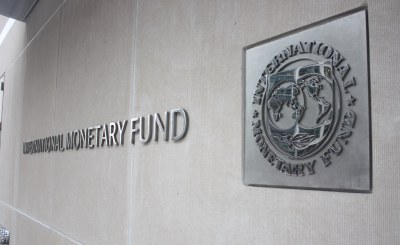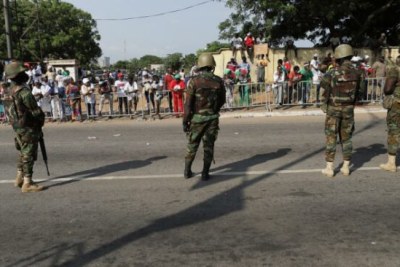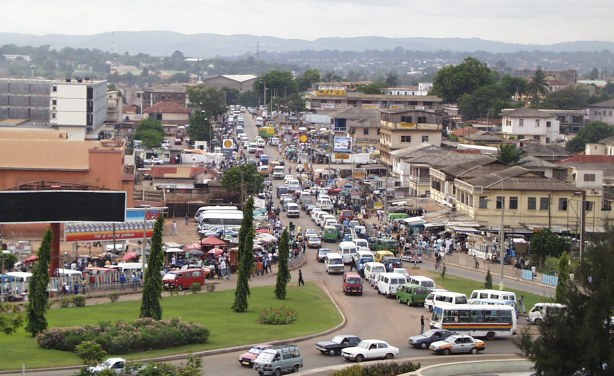-
Ghana: Ghana's Return to the IMF Within Three Years Underscores Its Deeper Economic Problems
The Conversation Africa, 17 July 2022
Ghana is again seeking assistance from the International Monetary Fund (IMF) to enable the country to meet its payments to the rest of the world and restore the health of… Read more »
-
Ghana: Debt Restructuring Must Go Hand-in-Hand With Managing Finances Better
The Conversation Africa, 10 October 2022
Ghana is struggling with managing its debt, 20-year high inflation, a weak currency, and rising inequality. For example, inflation rose to 33.9% in August 2022 from 9.7% a year… Read more »
-
Ghana: High Inflation Worsens Living Conditions
DW, 21 July 2022
Benjamin Yeboah, an Accra-based trader, is struggling to stay in business due to the high cost of importing and clearing his goods from Ghanaian ports. Read more »
-
Ghana: Pragmatic Approach Needed to Tackle High Inflation Rate - IEA Tells Government
Ghanaian Times, 15 July 2022
The Institute of Economic Affairs (IEA) has called for a pragmatic approach rather than an ideological approach to resolve the problem of high inflation which has become a… Read more »
-
Ghana: 4 'Blows' Forced Govt to IMF - Veep Explains Country's Decision to Seek Support From Fund
Ghanaian Times, 15 July 2022
The Vice President, Dr Mahamudu Bawumia, says the government's decision to seek support from the International Monetary Fund (IMF) is due to the fiscal impacts of four blows that… Read more »
-
Ghana: Finance Minister Reacts to Critics Calling for His Resignation Over IMF Bailout
Ghanaian Times, 18 July 2022
Ken Ofori-Atta, the Minister of Finance has responded to critics calling for his dismissal or resignation after the government made a U-turn by resorting to the International… Read more »
-
Ghana: Energy Debt, Banking Crisis, COVID-19, Reasons for Fiscal Deficit - - Dr Bawumia.
GhanaToday, 15 July 2022
Vice President Dr Mahamudu Bawumia has attributed Ghana's fiscal deficit and unsustainable debt stock to mainly the Energy Sector Excess Capacity payments, the Banking Crisis, the… Read more »
Asking IMF For Bailout Shows Ghana's Deeper Economic Problems
Ghana is again seeking assistance from the International Monetary Fund (IMF) to enable the country to meet its payments to the rest of the world and restore the health of government finances. It is the second time in the past three years and 17th since independence in 1957 that Ghana has turned to the IMF for help, writes Theophilus Acheampong for The Conversation.
The latest foray reverses the current administration's earlier stance that it would avoid approaching the multilateral body because of the conditions that come with its assistance. Ghana's finance minister Ken Ofori-Atta said in May 2022 that government was "confident in its homegrown solutions such as the e-levy in getting the economy to recover ... seeking a bailout from the IMF is not an option".
Real GDP growth slowed from an average of 6.9% from 2017-2019 to 0.4% in 2020 during the pandemic but picked up to 4.7% in 2021. Rising prices have forced the Bank of Ghana to raise its policy rate by 4.5 percentage points to 19% by May 2022 in an attempt to tame inflation. The local currency - the cedi - had depreciated by almost 20% against the US dollar as of June 2022, making imports more expensive, forcing prices of goods and services upwards.
Acheampong writes that Ghana should firstly use the IMF programme to negotiate some debt restructuring with commercial and multilateral creditors. Secondly, it must implement fully any agreed structural reforms to put the economy on a sound footing. Thirdly, the country must aggressively grow and diversify its small open economy to reduce reliance on primary commodities such as cocoa, gold and oil.
InFocus
-
The government has announced that it would approach the International Monetary Fund (IMF) for a bailout and the IMF's Country Representative, Dr Albert Touna-Mama, has confir Read more »





